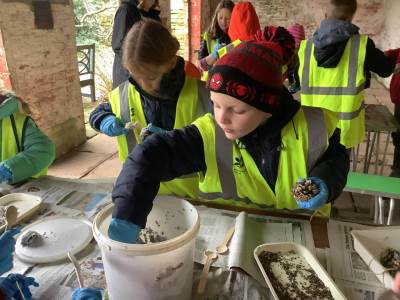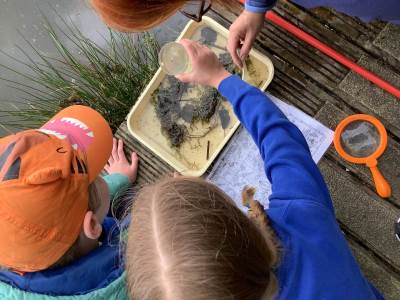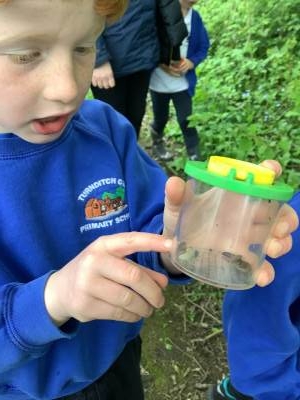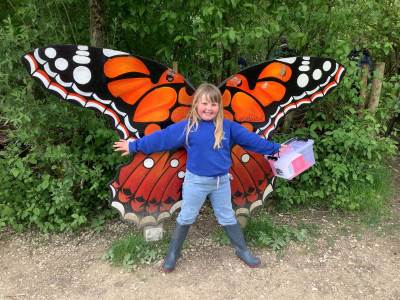Science
Science
At Turnditch, Science is one of our core subjects alongside English and Maths. Our Science curriculum fosters children’s natural curiosity starting with our very youngest pupils in our EYFS class. We aim to deliver an exciting and stimulating Science curriculum which encourages children to be inquisitive and develop transferable skills and a deeper understanding of the world in which they live.
Science is constantly evolving and changing our everyday lives and is vital to the world’s future. It is science education that provides the foundations for understanding the world. We daily make many science-based decisions when managing our health and daily living.
We encourage our children to discover, make links and pose questions ensuring that our pupils develop an understanding of the implications and uses of Science now and in the future.
The National Curriculum Programme of study for Science explains the statutory learning objectives and topics studied in Years 1 to 6.
The National Curriculum for Science aims to ensure that all pupils:
- Develop scientific knowledge and conceptual understanding through the specific disciplines of biology, chemistry and physics
- Develop understanding of the nature, processes and methods of science through different types of science enquiries that help them to answer scientific questions about the world around them
- Are equipped with the scientific knowledge required to understand the uses and implications of science, today and for the future.
- Working scientifically, following practical scientific methods, processes and skills through teaching scientific content.
At Turnditch, Science lessons are sequenced to ensure children build on prior learning and wherever possible learning experiences are practical to engage children in hands on learning. Our teaching ensures pupils regularly engage with Scientific learning across the full range of enquiry types as they develop their core knowledge and skills.
We support our pupils to think independently and to raise questions with an emphasis upon investigative practical work. We hope the children will develop lively, enquiring minds and the ability to think and work scientifically. We aim to support the curriculum with interesting trips, activities and visiting speakers.
What do we know about careers in science?
Learning in science, it’s all about innovation, discovery and research. Careers in science are genuinely some of the most exciting, interesting and significant out there, they are diverse. It’s all about improving people’s lives, improving commercial enterprises and developing knowledge and understanding of people, nature, the world and the universe. Jobs in the scientific sector include:
- Biomedical engineer
- Clinical psychologist
- Clinical scientist (various fields)
- Crime scene investigator
- Doctor
- Forensic scientist
- Hospital pharmacist
- Meteorologist
- Nurse
- Pharmacist
- Researcher
- Teacher
Spiritual, Moral, Social & Cultural (SMSC) Development in Science
At Turnditch, children’s social, moral, cultural and spiritual development underpins our Science curriculum. Science teaching is invaluable in developing children as confident, informed future global citizens who are able to lead an active life in an ever changing world.
SPIRITUAL – Science is using evidence to make sense of the world. It has the ability to make us feel both enormously insignificant (compared to the scale of the visible universe) and enormously significant (we are genetically unique). It helps us understand our relationship with the world around us (how the physical world behaves, the interdependence of all living things). Making new discoveries increases our
sense of awe and wonder at the complexities and elegance of the natural world. For scientists, this is a spiritual experience and drives us onwards in our search for understanding.
MORAL – Moral decisions are an important aspect of Science. As teachers, we encourage pupils to be both open minded (generating a hypothesis) and critical (demanding evidence) and to use their understanding of the world around them in a positive manner.
SOCIAL – Scientists are collaborators. Sharing ideas, data, and results (for further testing and development by others) is a key principle of the scientific method. We encourage pupils to work together on scientific investigations and to share results (to improve reliability). Science has a major impact on the quality of our lives.
CULTURAL – Science permeates modern culture, and has played a key part in developing it. It is (both currently and historically) an international activity. In Science lessons, we explore and celebrate research and developments that take place in many different cultures, both past and present.
Science at Turnditch strongly engages with the following SMCS aims
- sense of enjoyment and fascination in learning about themselves, others and the world around them
- use of imagination and creativity in their learning
- willingness to reflect on their experiences.
- ability to recognise the difference between right and wrong and to readily apply this understanding in their own lives, recognise legal boundaries and, in so doing, respect the civil and criminal law of England
- understanding of the consequences of their behaviour and actions
- interest in investigating and offering reasoned views about moral and ethical issues and ability to understand and appreciate the viewpoints of others on these issues.
How we teach science at Turnditch
We teach science (National Curriculum 2014 and Early Years Foundation Stage curriculum (EYFS)) in ways that are imaginative, purposeful, well-managed and enjoyable. We enable our children to make links between science and other subjects through Curriculum Maestro.
Cycle A
| Term 1 | Term 2 | Term 3 | ||||
| Reception | Exploring Autumn | Sparkle and Shine | Winter Wonderland | Dangerous Dinosaurs
Signs of Spring |
Sunshine and Sunflowers | On the Beach |
| Y1/2 | Everyday Materials | Human Senses | Seasonal Changes | Plant Parts | Animal Parts | |
| Y3/4 | Skeletal and Muscular systems | Forces and Magnets | Plant Nutrition and Reproduction | Light and Shadows | ||
| Y5/6 | Forces and Mechanisms | Earth and Space | Human Reproduction and Ageing | Properties and Changes of Materials | ||
Cycle B
| Term 1 | Term 2 | Term 3 | ||||
| Reception | Exploring Autumn | Sparkle and
Shine |
Winter Wonderland | Dangerous Dinosaurs
Signs of Spring |
Sunshine and Sunflowers | On the Beach |
| Y1/2 | Human Survival | Habitats | Uses of Materials | Plant Survival | Animal Survival | |
| Y3/4 | Digestive System | Sound | States of Matter | Grouping and Classifying | Electrical Circuits and Conductors | |
| Y5/6 | Circulatory System | Electrical Circuits and Components | Light Theory | Evolution and Inheritance | ||










